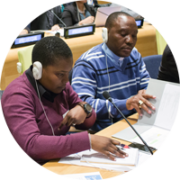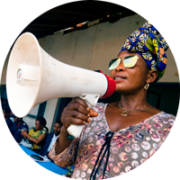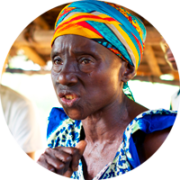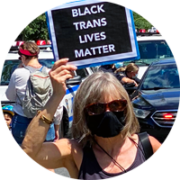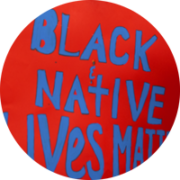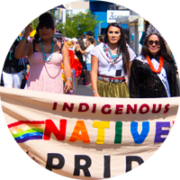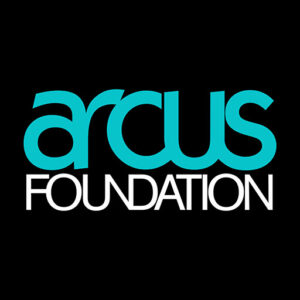Expansion is happening right now in social movements, a fresh awareness of racial and gender injustice among people across the United States and the world. We’re at a turning point, which means that the movements leading these efforts for a long time can now reach even further for justice.
There’s an unveiling, for all to see, of what we Black and Brown trans folks have always known about our society across the board, our institutions, homes, schools, workplaces, healthcare, and places of worship. Demands that would never have been met, or would have taken a much longer time to realize, are being accepted. The call to defund police is just one of them. And we as LGBT funders in this space need to grapple with this as a politic for our movements.
To do this work we’ve always looked to history and our ancestors. We’ve had to identify those who came before us and tell the stories of Marsha P. Johnson, Sylvia Rivera, and many more we can name, now including Lorena Borjas who passed away in Queens, New York, during the height of the pandemic. These are leaders who point the way, who keep Black and Brown trans folks alive, who founded and demanded resources for trans-led organizations, and who knew most what our communities needed.
In philanthropy, it had oftentimes been just a few trans folks and even fewer Black and Brown trans folks, and an even smaller group of trans women and femmes of color doing this work. I saw that myself while fundraising as a community organizer, a first-generation, formerly undocumented immigrant, a nonbinary and trans-Latina woman of color, an Oaklander living on Ohlone land, and with my own connection to indigenous ancestry among the Inca, and the Moche before them, in my country of birth, Peru.
Fund for Trans Generations Seeds U.S. Trans-Led Grassroots Groups
Coming to California, to the Bay Area, and into Borealis Philanthropy as senior program associate at the Fund for Trans Generations (FTG), I joined a team of three, participating together in all grantmaking decisions, and surrounded by colleagues who reflect the grassroots groups we serve. The collaborative fund of 6+ donors1 invests in trans-led organizing “to support a future where transgender, gender nonconforming, and nonbinary people live with freedom, safety, and self-determination.”
FTG Grantmaking Since 2016
The groups funded for almost five years are mostly emerging and have been doing this work for a long time without foundation support. I’ve experienced this in my organizing work and as a board member at El/La Para Trans Latinas, where we’re largely volunteer-run, unpaid, and under-resourced. One of our grantee partners, Mariposas Sin Fronteras (Butterflies Without Borders), for example, provides resources and support to the LGBTQ+ identified immigrant community in Tucson, Arizona. It is run by a small group of queer, trans people of color, some of whom have come into leadership after being in immigration detention.
We knew that trans folks of color, disabled, and immunocompromised trans people and undocumented and/or detained trans immigrants were going to be heavily impacted by the spread of the coronavirus. FTG already had a system in place to make rapid-response grants. Working with other trans-led funders, like Third Wave Fund, we created a common application tool to cut the paperwork burden on grantseekers and increase the resources we were able to jointly mobilize. Now you can submit one application, and we share review.
“We Knew the Stimulus Plan Wasn’t Going to Meet Our Needs”
Even with the best of efforts early on, we knew there was a lot that our folks were not going to be able to access. We knew the stimulus plan wasn’t going to meet our needs, like the tax system as a whole, and some undocumented people don’t engage with it anyway. So continuing to center racial justice and trans-led groups, Black and Brown trans women and femmes, and disability justice was a priority.
Most folks applying during the pandemic have requested funds for basic needs: food, housing, transportation, and medical treatments. Just going to the doctor for a regular checkup is violent for a trans person. So our grants included support for people experiencing housing insecurity, who are immunocompromised and/or living with HIV, who live with disabilities, and who are sex workers, poor or working class, and/or live in large and dense metropolitan areas.
The rapid-response grants are going out immediately to grantee partners, sometimes redistributed to individuals as microgrants, enabling other efforts to mobilize. For example, one of the COVID-19 specific rapid response grants was used by My Sistah’s House in Memphis, Tennessee, to support food and medical deliveries to more than 140 trans women self-quarantined during the pandemic, and to provide financial assistance for health and sanitary items to vulnerable and high-risk individuals in the city. The group, founded in 2017 by Kayla Gore, also used funds from the grant to launch an online campaign to build “tiny homes” on land beside the Loosahatchie River as safe spaces for trans women of color. The campaign had raised more than $280,000 by mid-July 2020.
Healing Justice amid a Pandemic
In addition to the years of constant attacks through the courts and through government, along with the rebellions saying “enough is enough” with George Floyd, Breonna Taylor, and Tony McDade, we now face a war against COVID-19, bringing new loss and grief to our communities. In response, we shifted our capacity-building small grants for general-support grantee partners to include a stronger emphasis on healing justice.
As we integrate healing practices into our grantmaking, we’re also still figuring out what this moment means. Our movement is shifting. All the folks that were named at the June 14, 2020, Brooklyn Black Trans Lives Matter protest against police violence: they were heard. That’s the power we’re in now, where Black trans women, like Raquel Willis, who spoke from the balcony of the Brooklyn Museum of Art, are leading an entire movement, where cis people are showing up and putting their bodies on the line.
The way forward is to continue to trust Black trans leadership; that is what FTG is doing, not just within the movement and grantee work, but within ourselves and our teams. There’s nowhere to shy away from this moment of accountability and alignment.
Usually our movements are light years ahead of where our organizations are, but we are now seeing an unprecedented alignment. We’re living in our trancestors’ wildest dreams.
We have to act swiftly, with care, and intention, knowing this is long-haul, unwavering work. ▅
1 Anonymous, Arcus Foundation, Collective Future Fund, Laughing Gull Foundation, Levi Strauss Foundation, Libra Foundation, Ms. Foundation for Women, NoVo Foundation, Open Society Foundations, and Tides Foundation.








